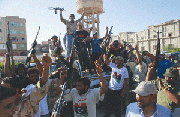BENGHAZI — Libya’s rebels pushed to strangle two supply lines to Tripoli on Wednesday, hoping to ratchet up pressure on the regime as their leaders prepared for the transition to democracy.

|
| Rebel fighters celebrate after taking control of the coastal town of Sabratha, 65 km (40 miles) west of Tripoli, August 18, 2011. Libyan rebels seized an oil refinery in the city of Zawiyah and took control of Sabratha further west on the main highway from Tripoli to Tunisia on Thursday, further isolating Muammar Gaddafi’s stronghold. REUTERS/Bob Strong |
Rebels fought to sever Tripoli’s supply lines from Tunisia to the west and to Muammar Gaddafi’s hometown of Sirte in the east, as they continued efforts to translate military victories into political pressure.
Fighting continued to the west of Tripoli at Zawiyah, with rebel officials claiming they were in control of “most” of the strategically vital oil port.
The town, which contains an oil refinery, “is being heavily shelled by Gaddafi forces from the east, but the population is not scared and will not leave,” said Colonel Ahmed Omar Bani, a military spokesman.
Bani added that the rebels were now pushing west toward the Tunisian border, an apparent bid to further strangle what limited supply lines remain.
“Zabrata and Sorman are now entirely under our control,” he said referring to two towns to the west of Zawiyah, adding there was now fierce fighting on an inland road parallel to the main coastal route around the town of Ajaylat.
It was the latest in a series of operations to cut off the capital, which the rebels hope will force defections from the regime and spark a Tripoli uprising against the nearly 42-year-old regime.
East of Tripoli rebels moved toward a town that links the capital and Sirte — Gaddafi’s hometown and a stronghold for his military.
“The scouting teams of the revolutionaries reached the outskirts of Al-Heisha after expelling Gaddafi’s forces,” the rebel military command said early Wednesday.
Al-Heisha lies roughly 45 miles south of Misrata and 150 miles from Tripoli, near two key crossroads that link loyalist-held territory in the west with that in the oil-rich Sirte basin.
But with rebels spread thinly across a fragmented front around Tripoli, their assault represented a slight tightening of the noose rather than the chair being kicked from under Gaddafi’s feet.
Still, anticipating victory, Libya’s rebel leaders set out a fresh plan to transform the country from autocracy to a full blown democracy, in a roadmap that could help define the country for decades to come.
The draft 14-page “constitutional declaration” plots a path — via the first elections seen in Libya since 1964 — to a new constitution and a multiparty democracy inspired by Islamic law.
“Libya is a democratic and independent state,” the document states, “the people are the source of authority, Tripoli is the capital, Islam is the religion and Islamic shari’a is the principal source of legislation.”
In 37 articles the text, drafted by the rebels’ de-facto government — the National Transitional Council (NTC) — sets out key milestones along a roughly two-year path to democracy including an assembly election, a constitutional referendum and a general election.
According to Richard Dalton, a former British ambassador to Tripoli and Tehran, the document is an admirable start.
“It is important, not only to anchor different groups within the NTC to something, but also to convince the international community about the NTC, which has been questioned after the (Abdel) Fatah Yunis murder.”
Rebel military chief General Yunis, a former interior minister and Gaddafi regime lynchpin, was assassinated July 28 after being recalled from the front line in Brega for questioning. His death remains shrouded in mystery.
“It is also important to put across to the people in Tripoli that they are not just a bunch of cowboys from the east,” Dalton added.
In a possible sign that Tripoli is starting to feel the pinch, power cuts have become more frequent and mobile telephone networks are suffering increased disruptions, while calls to Tunisia have been cut for two days, an AFP correspondent in the capital said.
NTC member Wahid Bourchan, meanwhile, said Wednesday that “discussions” and not negotiations did take place this week between some embattled regime members and its rebel challengers in Tunisia.
“Technocrats from the Gaddafi regime had contact with the insurgents. They asked for advice on places to go outside of the country,” said Bourchan.
“Many of the officials want to ask for political asylum in Europe and especially in France,” said Bourchan, who also heads a Libyan association based in Tunisia.
Bourchan insisted that the talks did not constitute negotiations.
“They were just individual demands,” he said.
There were reports over the past days about talks between Libyan rebels and regime representatives at the Tunisian town of Djerba, but rebel leaders denied any negotiations had taken place.
(MEO)






Leave a Reply